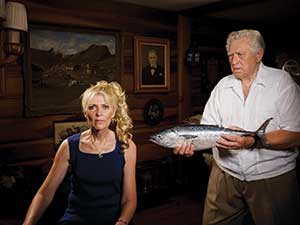
Photo: David Emmite | Cartoon by Steve Brodner
If the Bush administration had consciously plotted to leave office with one last jab at American scientists, it could hardly have done better than the North Atlantic right whale incident. This fish tale has everything: attacks on science, appeasement of special interests, delays in government action—even a cameo by Moby Dick Cheney.
North Atlantic right whales can grow to 55 feet in length and weigh 70 tons, but that hardly makes them invincible. Because they have a habit of calving amid shipping lanes off the Atlantic coast, the whales sometimes perish in collisions—no small matter when there are fewer than 400 of them left in existence. Accordingly, in 2006 the National Marine Fisheries Service (nmfs) sought to protect these endangered cetaceans by requiring speed limits for ships passing through critical areas at key times of year—in essence setting up the marine equivalent of school crossing zones.
But if science is a right whale, the Bush administration is a container ship doing 25 knots. The White House stalled, and continues to stall, the nmfs regulation, and now we know why. Behind the scenes, it has been indulging in opportunistic attacks on whale science that echoed those by the shipping industry, especially the World Shipping Council, a trade group that has lobbied heavily against the nmfs rule.
Last year, as the Fisheries Service sought to impose a 10 knot seasonal speed limit in certain areas, documents exposed by Rep. Henry Waxman (D-Calif.) and the Union of Concerned Scientists (ucs) show, several White House offices began challenging the seemingly indisputable fact that the faster a ship is going, the greater the danger it poses to whales. This conclusion is rooted in scientific observation, basic physics, and of course common sense—but that didn’t stop the president’s Council of Economic Advisers from undertaking its own highly selective reanalysis of whale mortality data. (Government fisheries experts called the book-cooking exercise “biased” and “unlike any formal sensitivity analysis nmfs biometricians are familiar with.”) The scientists also had to answer to the veep’s office: Cheney’s staff questioned whether it’s not the speed of the ship that counts, but its size. (To see how little sense this makes, compare being hit by a Prius at 60 miles per hour to being hit by a bus at the same speed—either way, your survival chances are basically nil.)
Waxman had this to say: “While I appreciate the value of vigorous scientific debate, I question why White House economic advisers are apparently conducting their own research on right whales and why the vice president’s staff is challenging the conclusions of the government’s scientific experts.” And indeed, the whole saga does seem pretty over the top. But it also perfectly fits a recurring pattern across President Bush’s two terms.
Again and again, at agency after agency, government science has been undermined, torqued, twisted, muzzled. For eight years the scandals have just kept coming—so much so that even very high-level appointees like the surgeon general and the director of the Centers for Disease Control and Prevention have encountered interference with their attempts to convey scientific information. “It is an outcome of the ‘faith based’ presidency, with many decisions made based on instincts rather than facts,” says Judith Curry, chair of the School of Earth and Atmospheric Sciences at Georgia Tech, who’s served as a nasa adviser. “The whole thing about faith is to believe things for which there is no empirical evidence. The Bush administration treats science as if you have a choice regarding whether or not to accept demonstrable scientific knowledge, analogous to the choice of which church to go to or which type of automobile to drive.” Meanwhile, the battery of insults has dragged down the morale of scientist civil servants and amped up the cynicism of Americans who’ve watched their government grow increasingly dysfunctional. “We’re beyond ‘here’s another abuse,'” says Francesca Grifo, director of the scientific integrity program at the ucs. “It’s more how they changed the system to turn it into this new kind of machine that perpetually sidelines the science.”
think of science as the oil that greases the engine of modern government. Without it, things don’t run properly and eventually break down completely. You don’t merely need good science to protect endangered species. You need it to regulate chemicals, preserve clean air and water, keep dangerous drugs and foods off the market, ensure highway and aviation safety, run a space program, forecast severe weather, and much, much more.
Accordingly, many branches of the US government basically amount to scientific dormitories. The Environmental Protection Agency, Department of the Interior, Department of Health and Human Services, Department of Commerce, Department of Agriculture, National Aeronautics and Space Administration—each employs thousands of scientists. And that’s not all: Collectively these agencies also have a few hundred scientific advisory committees to help them assess research implications. In one sense, it’s modern technocracy at its most arcane. But given the complexity of decision making today, it’s hard to see how you could run the country any other way.
This also means that by assaulting the science infrastructure, you can hobble government itself, and during the Bush administration, science abuse has been not only epidemic, but endemic. We can see this not only anecdotally—through myriad stories like the right whale saga—but statistically. Over the past three years, the Union of Concerned Scientists has surveyed 3,400 scientists across nine federal agencies and has consistently found alarming levels of job dissatisfaction and widespread complaints about political meddling.
Consider the National Marine Fisheries Service, which nestles, Russian-doll-like, inside a bigger science agency, the National Oceanic and Atmospheric Administration, which, in turn, resides within the Department of Commerce. nmfs is charged with implementing the Endangered Species Act in one narrow but critical area—the protection of marine species and anadromous fish like salmon, which migrate between freshwater and the sea; to this end, as well as to perform other marine stewardship duties, it employs some 500 scientists. The ucs took a poll of them in 2005 and found that more than half knew of instances in which commercial interests had “inappropriately induced the reversal or withdrawal of scientific conclusions or decisions through political intervention.” Further, more than a third of respondents said they had been “directed, for non-scientific reasons,” to avoid making findings that required protection of species in peril, and nearly a fourth had been “directed to inappropriately exclude or alter technical information” from scientific documents.
When we start to inquire who is doing the “directing” in such cases, we begin to get to the root of the problem. In the right whale instance, the interference with science came straight from the White House, and that’s true of many other science abuse stories, particularly those relating to high-profile subjects like global warming. (See “Climate of Meddling“) The White House Office of Management and Budget (omb) has even begun hiring its own scientists for this purpose.
Nevertheless, the White House simply lacks the resources to keep tabs on all the scientific activities throughout the entire government. And that’s where an army of some 3,000 political appointees, spread across the agencies, comes in. All too often they’ve acted as stand-ins for the interests of either religious conservatives opposed to abortion and contraception or industry groups intent on blocking regulation, or as messengers for an ideology that suspects government-employed scientists of being liberal do-gooders (or as one conservative put it, “science moles”) out to block the Bush agenda. Over the past eight years these appointees have fallen into repeated conflicts with agency career scientists as they have served as “minders” and the forceful editors of scientific documents.
All of which suggests that fixing the science abuse problem is in significant part a matter of staffing. The White House and the administration’s political appointees can still, of course, set policy—that’s what they’re there for—but they must keep their hands off actual science. That’s where the line was drawn for decades, until Bush erased it.
they called it “Julie proofing”: a strategy for avoiding unwanted attention from Deputy Assistant Secretary of the Interior Julie MacDonald, who became legendary for meddling with Fish and Wildlife Service scientists whose research indicated a need for greater protections for endangered species. After enough run-ins, the scientists would learn to self-censor, anticipating MacDonald’s hostile line of questioning, and modifying their own work (and conclusions) accordingly.
MacDonald was a civil engineer by training and had a history in California Republican politics. But just like White House economic advisers in the right whale case, her background didn’t stop her from challenging government wildlife experts and digging deep into their realm of expertise.  According to an investigation by the Interior Department’s inspector general that eventually led to her resignation, MacDonald had been “heavily involved with editing, commenting on, and reshaping the Endangered Species Program’s scientific reports from the field.” That included, in some cases, directly contacting individual scientists (rather than their superiors) to hector them, demanding that they change their conclusions and reach ones more conducive to private industry.
According to an investigation by the Interior Department’s inspector general that eventually led to her resignation, MacDonald had been “heavily involved with editing, commenting on, and reshaping the Endangered Species Program’s scientific reports from the field.” That included, in some cases, directly contacting individual scientists (rather than their superiors) to hector them, demanding that they change their conclusions and reach ones more conducive to private industry.
And even that wasn’t the biggest scandal. MacDonald also shared internal agency documents with a pro-industry law firm, a lobbyist for the California Farm Bureau Federation, and two people with “chevrontexaco.com” email addresses. By law, the listing of endangered species must proceed solely based on science, but with MacDonald calling the shots, the science itself was recrafted to favor her political inclinations.
MacDonald was just one of several thousand political appointees installed by the Bush administration, which at its peak contained 350 more political appointees than there were at the end of Clinton’s years. While some of them may have been excellent managers, their general job qualifications are, by definition, political, making them acutely aware of the interests of private industry and the religious right, which put the Bush government in power.
Consider nasa, where climate scientist James Hansen alleged that political appointees at the public affairs office had sought to block his ability to discuss global warming with the media. Hansen’s central antagonist was a young political appointee named George Deutsch, who had worked on George W. Bush’s 2004 presidential campaign and hadn’t, at the time of his conflict with Hansen, yet obtained a college diploma. Hansen’s charges were vindicated by nasa‘s inspector general, who also chronicled repeated instances in which the press office had distorted and suppressed scientific press releases about global warming. “In sum,” the inspector general concluded, “none of this course of conduct was in the public’s best interest.”
Similarly, when the press came calling for interviews about the relationship between hurricanes and global warming in the wake of Katrina, the National Oceanic and Atmospheric Administration found itself having to answer to political appointees—who handpicked which scientists could talk to the media, and which couldn’t. One such appointee in the Commerce Department’s public affairs office, Chuck Fuqua, had directed media operations for the 2004 Republican National Convention.
These are all, in essence, Julie MacDonald stories. They suggest that if the next administration wishes to fix the science problem bequeathed by the Bush administration, it must entrust far more duties, especially at the subterranean levels of government, to career civil servants.
the environmental Protection Agency represents the epitome of a science agency—it employs more than 6,000 staff with specifically scientific duties at its central headquarters, 10 regional offices, and numerous laboratories. Particularly science-intensive sectors include the Office of Air and Radiation (which sets clean air standards), the Office of Prevention, Pesticides, and Toxic Substances, and the Office of Research and Development. This science bureaucracy has become more and more embattled: In a recently released ucs survey of nearly 900 epa researchers, 60 percent reported at least one incident of political interference during the past five years, and more than half (560 scientists) knew of “many or some cases” in which political appointees at other agencies had inappropriately been involved in agency decisions.
Nearly 100 epa scientists surveyed by the ucs pointed the finger directly at the White House. As one scientist put it, “They truly interfere and want to stamp the White House Agenda over every document that is sent to them for review. They have hired their own scientists and play the ‘my scientist is better than yours’ game. The epa has to accept a lot of shit from them to get any documents out.” It also has to put up with being ignored. The New York Times recently reported that the omb simply refused to open an email from the agency containing a proposal to regulate greenhouse gas emissions—a proposal made in response to nothing less than a Supreme Court order. Indeed, the epa has been constantly reversed in court of late, in part because it has been misstating science and rigging its analyses to justify its weak-tea regulatory actions.
In a particularly telltale case, epa Administrator Stephen Johnson recently overruled his own Clean Air Science Advisory Committee recommendation to tighten regulation of particulate matter, even though the committee had supported such action by a 22-2 margin. Such behaviors prompted the coalition of unions representing epa scientists to charge that the epa “ignores its own Principles of Scientific Integrity whenever political direction from other federal entities or private sector interests so direct.”
One of the nastiest slaps at epa science is perhaps the most obscure. In 2006, facing cuts, the agency shut down a number of libraries, including a chemical library that scientists had relied upon to assess the dangers of various substances and especially seek out different information than the spin provided to them by private industry. So not only are epa scientists repeatedly having their science reversed, disregarded, and micromanaged; they can’t even conduct adequate research in the first place.
the food and Drug Administration, too, has been beset by science scandals—Plan B emergency contraception and Vioxx come to mind. Indeed, in 2007 the agency’s own science board reported that the fda “suffers from serious scientific deficiencies and is not positioned to meet current or emerging regulatory responsibilities.”
But fda whistleblower Susan Wood—director of the Office of Women’s Health until she resigned over continuing delays in the approval of Plan B for over-the-counter use—says we mustn’t get bogged down in specific scandals and miss the big picture. Fundamentally, what befell the fda is pernicious neglect. The administration simply didn’t care about the agency’s mission, or even want it to function properly. The fda, notes Wood, went without a commissioner for well more than a year into the Bush administration; since then, it hasn’t had a leader who lasted longer than a year and a half. The message is clear: “We don’t value you,” explains Wood.
That’s been the message for eight long years, which is why our next president must immediately signal that he takes science seriously. He can start by appointing a presidential science adviser who enjoys a Cabinet rank (unlike Bush’s current science adviser, physicist John Marburger) and charge her, and relevant Cabinet secretaries, with closely monitoring each agency with the explicit goal of ensuring research integrity. “Once the politicization is stopped,” says Georgia Tech’s Curry, “leading scientists will stop leaving these agencies, and bright young scientists will once again view civil service positions in government laboratories as desirable positions, and these agencies can serve the public at the level that they should.”















